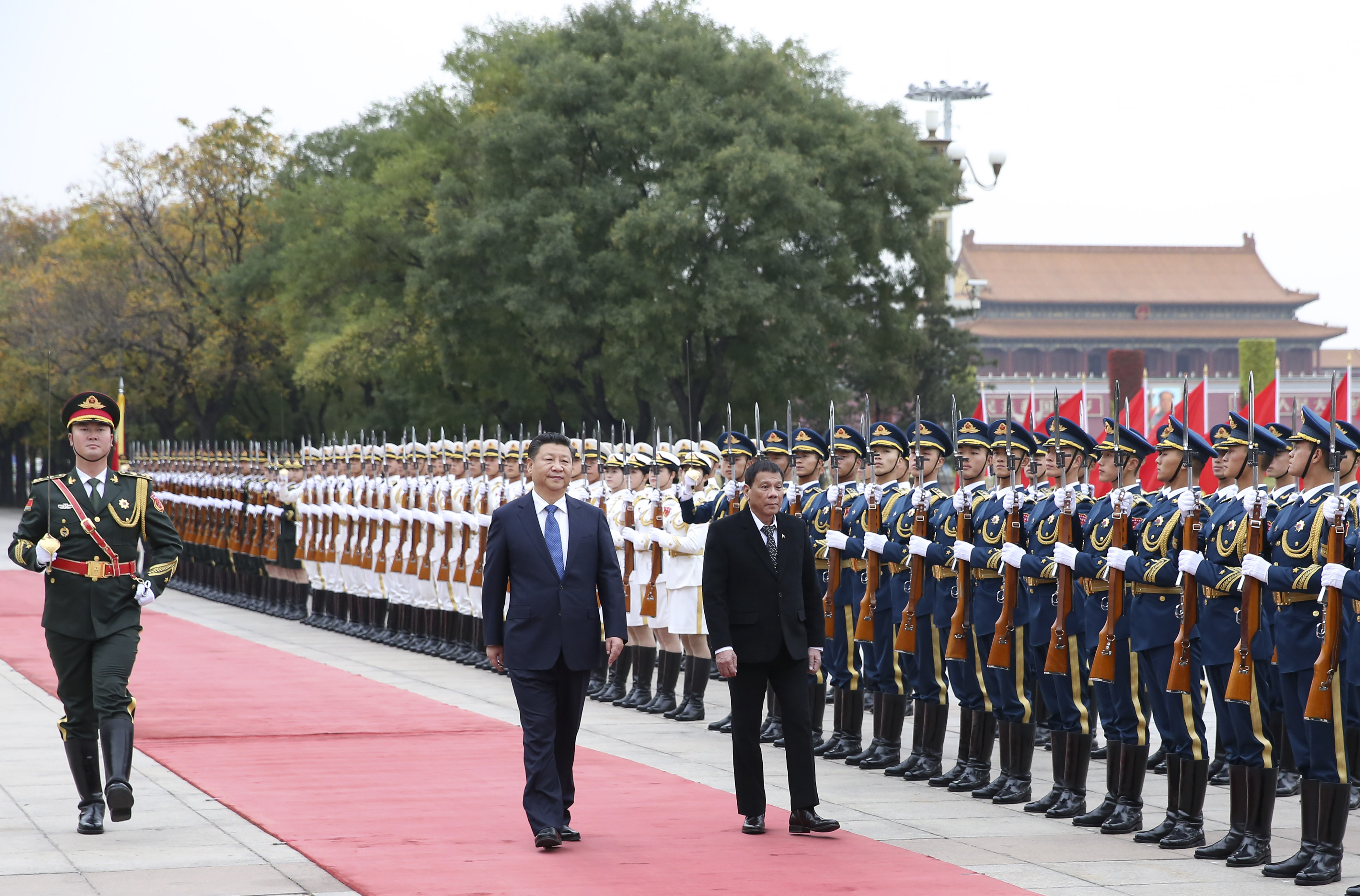Media Report

- The New York Times reports: "President Rodrigo Duterte of the Philippines and China's leader, Xi Jinping, agreed on Thursday to resume direct talks on disputes in the South China Sea after years of escalating tension, a sign of warming relations with Beijing. The announcement came during Mr. Duterte's state visit to China, as he repeatedly sought to distance the Philippines from the United States, a treaty ally. Mr. Duterte, speaking to business leaders shortly after meeting with Mr. Xi, openly declared a 'separation from the United States.' He refrained, however, from saying that he would revoke a 70-year-old treaty alliance with Washington and made no indication of doing what China would like most: scrapping an accord that gives the United States access to five military bases in the Philippines....But Mr. Duterte has alarmed United States officials by asserting that the Philippines would reduce its military cooperation with Washington, and his openly anti-American sentiments this week, as well as his tilt toward Beijing, may add to their concerns. How far Mr. Duterte, whose military is underequipped and poorly trained, will venture in actually splitting from the United States is still unclear."
- The Washington Post: WorldViews comments: "It was a familiar theme for Donald Trump. China's leaders are smarter than their American counterparts. China's economy is growing much faster than the U.S. economy, and it is one of those countries 'raiding'American jobs. China was cast as the foil to expose the weakness of the Obama administration and, by extension, Hillary Clinton. Ironically, China's 'smart' leaders didn't let their people watch the debate. The third U.S. presidential debate was blocked on Chinese media websites....China's leadership presumably isn't that impressed with Trump's backhanded compliments. More to the point: China's state media might gloat that this presidential race — and in particular the rise of a 'racist' demagogue like Trump — shows that democracy is 'scary.' But there is clearly something unsettling to China's leaders with the idea of two presidential candidates facing off on live television, being asked searching questions, and presenting a democratic choice to the citizens of their country."
- The Wall Street Journal: China Real Time comments: "The Communist Party has widely touted a campaign to improve rule of law in China. Beijing's critics call that a farce. A new global ranking released on Thursday reaches a more nuanced conclusion: China is making limited progress—though not necessarily in ways likely to impress the West....Since declaring its intent to improve rule of law in late 2014, the Communist Party has rolled out policies designed to give more power to courts and improve the credibility of China's legal system. Officials and state-affiliated scholars have said the overhauls were needed to underpin economic growth and shore up the party's legitimacy. While legal experts agree such steps are urgently needed, critics inside and outside China note that the party retains ultimate control over the courts. Conviction rates are near 100% in criminal trials. Confessions extracted through torture remain common despite being banned, legal activists say. And jailed government critics frequently appear in pretrial televised confessions that supporters believe are coerced. Such a system, legal experts argue, constitutes not rule of law, but rather 'rule by law.'"
Calendar
- 2016-10-19 As China’s Economy Slows, a Look at What Could Happen
- 2016-10-18 Kenya: China petitioned to stop building railway in park
- 2016-10-17 China courts Philippines leader Duterte amid signs of US rift
- 2016-10-16 Philippine Leader Rodrigo Duterte Rolls Dice With Embrace of China
- 2016-10-14 Study: China's 2-Child Policy Won't Lead to Population Boom
- 2016-10-13 US Reserves Right to Punish China Firms Working With NKorea
- 2016-10-12 Russia Says It’s Joining China to Counter U.S. Missile Defense
- 2016-10-11 For China’s Leaders, U.S. Election Scandals Make the Case for One-Party Rule
- 2016-10-10 Tourists Behaving Badly: Name-and-Shame Effort Fails to Fix China’s Image
- 2016-10-07 How a Trump or Clinton presidency could hurt China's economy
News
- The New York Times Rodrigo Duterte and Xi Jinping Agree to Reopen South China Sea Talks
- TIME Philippine President Duterte's Bold Move on China Spells Trouble Ahead
- The Wall Street Journal Crown Urges Investors Not to Cash In Chips Over China Troubles
- Reuters Refocus of China's anti-graft campaign means almost anyone a target
- Bloomberg Markets China Capital Flow Crackdown Results in $148 Billion Bust
- The Wall Street Journal China's Geely to Launch Auto Brand With Ride-Sharing Appeal
- Reuters Transition challenges highlighted as China third-quarter income growth slows
- The Washington Post China, Philippine to sign $13.5B deals, hold sea bilaterals
- The New York Times Milan Honors Dalai Lama as Citizen Over China's Objections
- CNBC China's still growing, but fears are rising that it won't last
- The Wall Street Journal In Setback to U.S., Philippines Sets Aside Dispute With China
- The Washington Post The Latest: Philippine leader says will 'separate' from US
- Bloomberg Markets Duterte Bids U.S. Farewell With Embrace of Xi, Putin in Beijing
Commentary
- The Washington Post: WorldViews Trump thinks China's leaders are smarter. They didn't even let their people watch the debate.
- The Wall Street Journal: China Real Time China Lags Behind in Rule-of-Law Ranking
- The New York Times: DealB%k In Push for G.M.O.s, China Battles Fears of 8-Legged Chickens
- Foreign Policy: Tea Leaf Nation I Broadcast Myself on the Chinese Web for Two Weeks
- The Diplomat Avoiding Groupthink on China
- The National Interest Why Russia and China Should Fear the X-37B Space Plane
- The Economist Xi Jinping is a strongman. That does not mean he gets his way
